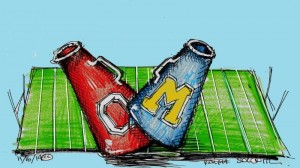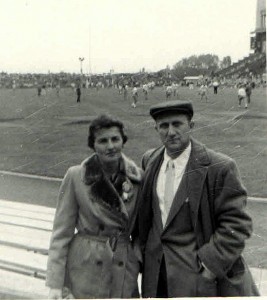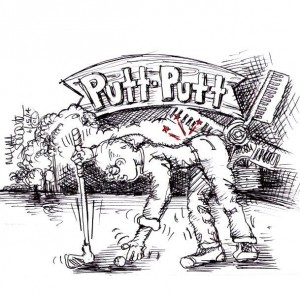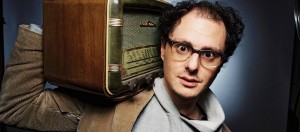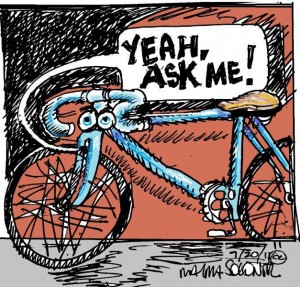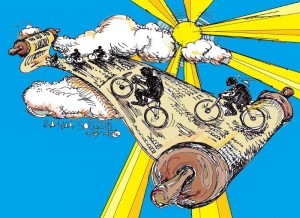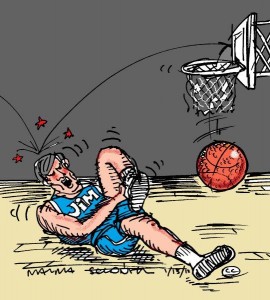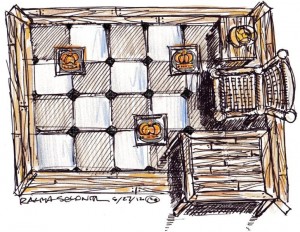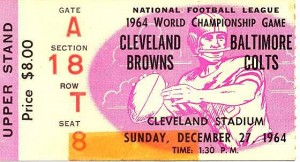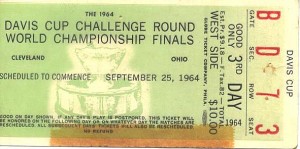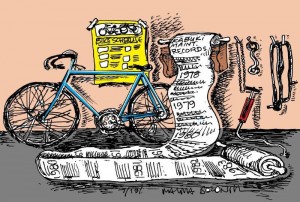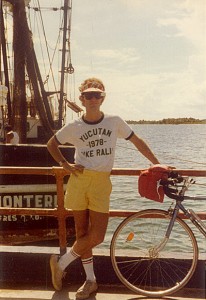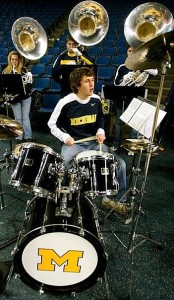Category — Sports Pages
IT’S NOT ABOUT THE RACKET
From today’s Cleveland Plain Dealer . . .
It’s not about the racket
by Bert Stratton
CLEVELAND HEIGHTS, Ohio — When I trounced my friend Jimmy in tennis, he blamed it on his racket. His racket — his good racket — was in the shop for restringing. Jimmy said he was hitting the ball longer than usual with his back-up racket, and he didn’t have his usual deft touch on drop shots. I was surprised by the kvetching; Jimmy is usually stoical about his game and has never been an equipment freak.
Lance Armstrong said it best: “It’s not about the bike.” Or, it’s not about the racket. For example, I have a childhood friend who is a tennis pro in Israel, and he occasionally comes back to Cleveland to visit relatives and beat me in tennis. My friend, Shelly Gordon, doesn’t even bring a racket with him from Israel; he borrows one of mine. Shelly and I grew up playing tennis on the public courts at Bexley Park in South Euclid. The dress code then, in the 1960s, was Bermuda shorts, Jack Purcell tennis shoes and T-shirt (optional). Shelly never took private tennis lessons; nevertheless, he made the Ohio State University tennis team.
I took about 10 private lessons at the Cleveland Skating Club in Shaker Heights. My dad paid a nonmembers’ rate for the lessons. The club pro called me “Tiger.” I think he called all nonmembers “Tiger” because he didn’t want to learn their names.
At a recent high school reunion, a former Brush High tennis player was still mad at me — and envious of me for my private lessons. Hotshot players like him, from all over the East Side, would schlep down to Cain Park in Cleveland Heights, where the best public-court players hung out. There was a Cleveland Heights High player, Rich Greenberg, who was so into tennis he would shovel snow off the courts in the winter. He eventually played for the University of California at Santa Barbara.

Bert Stratton, age 16, 1967, Brush High courts
Rich taught me an important life lesson: how to wait. Every winter, I had to wait six months for good weather to come around again, so I could play tennis. I wasn’t going to shovel courts. Think about it: No snow blowers in the 1960s, and the courts had to be perfectly dry. And right after you shoveled, it would snow again. (And we didn’t have access to indoor courts.)
When I played my friend Kvetchin’ Jimmy — the man with the bad racket — he muttered unintelligible things to himself and fiddled with his strings. I beat him 6-2, 6-2. He usually beats me. Funny, I, too, had a handicap. But did I complain? No, I didn’t. My left hand (my dominant hand) tingled from having played a steel-string acoustic guitar the night before. I didn’t mention that to Jimmy. Probably because I won.
In tennis, it’s all on you. There’s usually nobody else to blame. Here’s a useful rule: If you lose, blame the wind. That’s less offensive than blaming your racket.
—
Yiddishe Cup performs 2-3 pm this Sun. (June 16). Father’s Day. Free. Beachwood Branch, Cuyahoga County Library, 25501 Shaker Blvd. (corner of Shaker Boulevard and Richmond Road). Indoors.
June 12, 2024 3 Comments
TURN IT DOWN!
The bride asked if Yiddishe Cup would play quietly. I said, “Great! I’m in two Facebook groups, ‘I Hate Cilantro’ and ‘I Hate Loud Music.’”
I attended another wedding — as a guest — where the band blasted like they were at Noriega’s palace. Then a DJ in an adjoining room (behind a party-center folding partition) blasted like he was shooting a cannon.
There were about 225 guests at that wedding. I was the only one bugged? Apparently. My wife thought the band was terrific. She said, “They are like a magnet, pulling me to the dance floor.” (My wife was a like magnet pulling me to the dance floor.)
The band had no keyboard player or bass player. The lead singer cued backing tracks on his laptop. The drummer faked playing a lot.
My late rabbi, Michael Hecht, could have been the president of the “I Hate Loud Music” society. Every time Yiddishe Cup played at his shul, Congregation Beth Am, he would ask us to turn it down. One time my sound guy/pianist said, “I can’t turn it down any more. The sound system is completely off.”
Rabbi Hecht’s understudy is me. Hey, turn it down!
August 24, 2022 3 Comments
WHAT ARE THE ODDS?
I’ve been to approximately 60 Cleveland Indians games and seen three no-hitters. What are the odds on that? Call the Freakonomics guy.
I am a fair-weather fan! For two of the three no-hitters, I didn’t even know who the players were. Like now, I can’t name any of the Guardians players.
I saw Toronto’s Dave Stieb no-hit the Tribe in 1990. I didn’t know any of the Cleveland players then. I saw Cleveland’s Dick Bosman throw a no-hitter in 1974; again, I didn’t know any of the Cleveland players except Buddy Bell, who I recognized as Gus Bell’s son.
1966 — my first no-hitter. Sonny Siebert, 2-0, against the Senators. I knew the players. I was in high school: Azcue, Alvis, Davalillo, Wagner, Colavito.
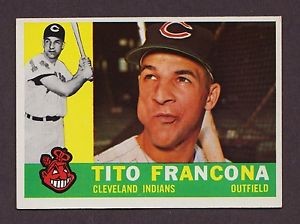
Francona batted .363 in 1959 but was 34 at-bats shy of the minimum needed, so the batting title went to Harvey Kuenn.
I used to get free tickets to the games in high school for straight A’s. I didn’t get straight A’s but the Cleveland Press (which gave out the free tix) didn’t care about a B or two, as long as if you provided a written explanation. “This class is AP,” etc.
By the way, I’m uneasy with the fine-print mention of “Harvey Kuenn” in the photo caption above. April 19, 1960. What a dark day. Frankie Lane unloaded The Rock for Kuenn. That was the day I learned life isn’t fair. Still adjusting.
July 27, 2022 4 Comments
THE TENNIS COURT SHOVELER
When Rich Greenberg and I were in high school, tennis was a tree of life to them that lay hold fast of it. Rich shoveled the snow off the courts at Cain Park in Cleveland Heights. Nuts. He played so well he wound up on the UC-Santa Barbara team. I waited six months every winter for spring tennis. I wasn’t going to shovel courts.Think about it: no snow blowers in the 1960s, and the courts had to be perfectly dry.
Contemplating tennis — and not playing — was like practicing music without an instrument. It was doable, but not much fun. I owned Bill Tilden’s book on singles and Gardnar Mulloy’s doubles book. There was no tennis on TV. We didn’t have access to indoor courts.
Tim Gallwey’s The Inner Game of Tennis (1974) recommends watching the spin on the ball. Focus on the rotation of the ball’s seams. The author of The Inner Game of Music said something similar. Focus. I can’t remember on what. (Not as good a book as Inner Tennis.)
When I play a concert, I sometimes focus on an imaginary green cot as a mental image. The cot is an emergency-shelter Red Cross cot. Keeps me calm.
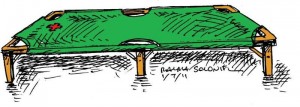
When I was a sub on a gig, the bandleader shouted at me: “Listen!” Meaning “Listen to the music!” Maybe I was distracted by the hors d’oeuvre.
In my twenties — after college — I thought tennis was dumb. Two adults hitting a ball over a net. That was not solving any problem. I hung out with Rich at his tennis pro job in Rocky River, Ohio. Rich said he couldn’t teach the middle-aged women — the 35 year olds — anything new. He said, “I wish tennis hadn’t boomed. It would force me to do something else.” He spent time arranging inter-clubs between “our girls” and Lorain. He eventually moved to Seattle and did something else. Insurance, for one thing. And he plays harmonica in a blues band.
January 30, 2019 4 Comments
BIG IN TENNIS
My mother drove me to tennis tournaments, like at Denison Park on the West Side and even to Youngstown. I would invariably lose my matches. I was good at my local park but not at USTA events. The first guy I played in a USTA tournament was Kevin Senich, who was two years younger than me and about a foot taller. I was afraid he’d hit me in the face with his fast serve. He beat me 6-0, 6-0. Maybe 6-0, 6-1. Hard to remember. My mother took me to Isley’s ice cream afterwards. Senich won the state doubles in his sophomore year, and a lot of other stuff.
I was at the Cleveland Racquet Club last year and asked my present tennis partner, “Where’s Senich?” Because I knew Senich was a Racquet Club member. My partner said, “I think he died.”
I looked Senich up. He died at 62. I remember his mother was from Ireland. Senich never knew me, but I knew him.
After I wrote this, I realized Senich didn’t beat me. It was Jim Bright, a state singles runner-up from Lima High. Bright, too, was a big guy.
Senich beat me later.
Kevin Senich, Parma High
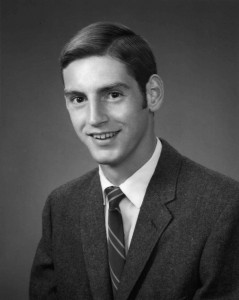
In 1968, Kevin Senich was undefeated in singles play for the Parma Redmen. Teaming with his brother Mike, they won both the district and OHSAA state championship in doubles play. In college, Kevin earned four varsity letters at the University of Michigan, earning All-Big Ten honors twice. He won 5 individual Big Ten championships as a member of the four-time Big Ten championship team. As a team captain of the 1974 Michigan team, he was ranked 3rd in the NCAA.
February 7, 2018 2 Comments
THE YIDDISHE CUP FIGHT SONG
Yiddishe Cup’s singer, Irwin Weinberger, wrote a song about attending baseball games with his father. Irwin even mentioned The Rock in the song — Rocky Colavito. Guys are supposed to talk about sports, and drink when they get together. I know this isn’t always a fact. One Yiddishe Cup musician calls sports a “cult.”
The town is going ape-wire over the Cleveland Cavaliers again. Some of the guys don’t care.
Some of the guys do.
In 1997, when the Indians were in the World Series, Yiddishe Cup was playing Simchat Torah gigs, and we hid in the temple cloak room and caught bits of the action on a small portable TV.
Yiddishe Cup is not sports adverse. We play fight songs. Here are the fight songs you need to know in our part of the Midwest:
1. Ohio State’s “Hang On Sloopy” and “Fight The Team Across the Field.” Sometimes we hold off on “Hang On Sloopy” until the Buckeyes score. That’s the protocol. If you play “Hang on Sloopy” before the Bucks score, it’s bad luck.
2. Michigan’s “The Victors” is a biggie. Also, Michigan State, “On Wisconsin,” and the Pitt fight song, which is not the same as the Steelers’ song. Forget about Notre Dame –for a klez band.
Yiddishe Cup knows “Are You From Wooster?”:
If you’re from Oberlin or Denison or Wesleyan U.,
The Scots will take good care of you before they’re through.
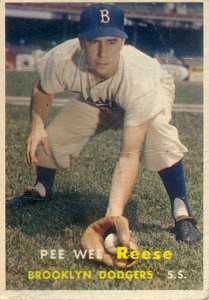
Beisbol! 1957
—
A version of this first appeared 6/3/09.
May 31, 2017 3 Comments
OHIO STATE VS. MICHIGAN
I was at a brunch where all the men wore Ohio State apparel. That in itself was not unusual; I know a lot of Ohio State fans who do brunch, but the host at this brunch was particularly Bucks-nuts; he would not let anybody into his house with Michigan gear on.
I’m not that big a football fan. I’m a Michigan graduate but I wish Ohio State all the best — most of the time. I like it when Michigan is winning, but this year the team is horrible, so let Ohio State go all the way.
Yiddishe Cup had a trumpet player — a sub — who played in the Ohio State marching band. He played a luncheon with Yiddishe Cup, and the OSU-Michigan game (originally scheduled for 3 pm) went on at noon, so I gave the musician leeway on the bandstand; I let him periodically watch the Bucks on a TV in a corner. The other guys in the band thought I was too accommodating. They didn’t
understand . . .
Take 1962: OSU versus Northwestern, homecoming. Before the game, my dad and I went to a reunion luncheon. My dad had on a Class of ’38 name tag. I don’t know what the name tag read; my father changed his name from Soltzberg to Stratton in 1941. The theme for the fraternity floats in 1962 may have been “Peanuts.” My dad knew the words to “Carmen Ohio,” the OSU alma mater. My dad never knew the words to any song!
My dad and I went to about a half dozen Ohio State homecomings. I liked Long’s Bookstore for sweatshirts. Charbert’s for hamburgers. We checked out the floats on fraternity row. My dad wanted to show me the medical school.
The Bucks: Tom Matte, Warfield, Matt Snell and Bob Ferguson.
If Michigan doesn’t win it all (and it ain’t going to this year), let Ohio State.
November 26, 2014 2 Comments
WHATEVER HAPPENED
TO PUTT-PUTT?
My son Teddy had a birthday party at Putt-Putt on Northfield Road. This was in 1990. I think that’s the last time I played Putt-Putt — official Putt-Putt. There are only 49 Putt-Putt courses left in the United States.
There was a Chinese miniature golf course on Libby Road at Broadway Avenue in Cleveland. (I think that’s where it was.) It had a Buddha that went up and down. My high school friends and I couldn’t get enough of that course.
Arnold Palmer Miniature Golf . . . Just had to say that.
I would like to live long enough to play Putt-Putt with my grandchildren. (First, I need the grandchildren.) I want to stay healthy enough to bend down and pick up the ball. That’s the hardest part of mini golf.
Adventure golf, such as Pirate’s Cove, sounds good.
—
There’s a vid version of this post — slightly more in-depth. (Originally posted in 2011).
—
Come to Cain Park, Cleveland Heights, 7 p.m. Sun. (June 29) for a free klezmer concert by the Josh “Socalled” Dolgin Sextet, featuring super clarinetist Michael Winograd. (Jack Stratton on drums.)
—
Here’s a new vid, Don Bryon Salutes Mickey Katz.
June 25, 2014 8 Comments
BICYCLING WITH
AND WITHOUT JEWS
On the Great Ohio Bicycle Adventure (GOBA), I’m around far fewer Jews than I’m used to. I’m most comfortable with a 20 percent-or-more Jewish crowd in life. If the Jewish count is less than that, I get a bit uneasy, mostly because less people understand my sense of humor.
My high school was about 25 percent Jewish; my college was about 20 percent Jewish; my social scene in Cleveland is 58.7 percent Jewish; and my place of worship is 100 percent.
On GOBA, there are at most 20 Jews out of 2,500 riders. It’s like a motorcycle rally in Sturgis, South Dakota.
Oddly, one year (2009) I pedaled GOBA with an Orthodox woman. She brought more tuna fish than Nixon took to China. She wore a skirt. There was an Amish woman with a skirt too. The Frisco Kid: Gene Wilder and the Amish thing. Maybe both women will be at GOBA this year.
In 2010 I met a Jewish doctor from Dayton, Ohio; a Jewish guitar player from University Heights; and my buddy — and fellow cyclist — Irwin Weinberger (Yidddishe Cup’s singer) played “Ose Shalom” on Friday night. This was after a fried fish shabbes dinner at the Fraternal Order of Eagles hall in McArthur, Ohio. We made kiddush over Miller Lite, which technically isn’t brucha (blessing) material. (Tain’t a grape.)
GOBA kicks off in Mansfield, Ohio, this Sunday.
—
Gear shift . . .
Is there a market for a Jewish-tinged “Chosen to Ride” bike tour of the Midwest?
Day 1
We meet at Chicago Midway airport and bike to Pepe’s, a Mexican restaurant on Cicero Avenue. Traffic is crazy but fun in Chicago. Bring a helmet and a sword.
Lodging at the Beloit, Wisconsin, Holiday Inn.
Day 2
Lunch stop at the Park View Motel, Richland Center, Wisconsin, next to AgriDairy. See the Frank Lloyd Wright silo.
Dinner at the Ground Round, Dubuque, Iowa.
Day 3
Pitch tents on the lawn of the Omaha JCC and check out the exhibit in the hallway about The Bagel, the name for the old Jewish ‘hood in Omaha.
Day 4
Dinner in Nevada, Missouri. We’ll eat in the cafeteria at Cottey College, an all-women’s school.
Days 5 and 6
Shabbes in St. Louis. We spend time off the bikes and at riverboat casinos, where we suck cig smoke and lose a few fun bucks. Each night we’re at Ted Drewes custard stand.
Day 7
Dinner at Wabash College, an all-men’s college in Crawfordsville, Indiana. Equal rights for men.
Day 8
At the Indianapolis Hebrew Congregation, we attend a concert by Gabe Kaplan and Yiddishe Cup. Kaplan doesn’t look like Gabe Kaplan anymore. He’s a million years old. (As is Yiddishe Cup.) Kaplan’s best joke is “A widower in Miami Beach asks his date, an elderly woman, if she likes sex, and she says, ‘Infrequently.’ The widower says, ‘Is that one word or two?’”
Day 9
Our farewell banquet is at Ken’s Diner in Skokie, Illinois, a glatt kosher hamburger joint. Music by the clarinet/harp duo of Kurt and Annette Bjorling.
Think about it.
—-
Yiddishe Cup is in Parade the Circle noon Saturday (June 14), Wade Oval, Cleveland.
June 11, 2014 4 Comments
BE WELL
My friend Jimmy plays basketball at age 55. But he’s hurting. Jimmy has plantar fasciitis and is temporarily out of action.
I’m glad Jimmy is hurt. Some guys think they’re going to be pain-free forever. It’s fun — sick fun — to watch them get zapped by the middle-age hand buzzer.
I ran into a guy who was on Penn”s all-star lacrosse team. In 1955. He’s 80. He said, “You have to know when to quit, but it’s impossible to know. I never know.” He has stopped playing lacrosse, squash, basketball and singles tennis. His advice: “Take up painting.”
I said, “I already do things like that.” (I play klezmer music.)
Jimmy — my b-ball friend — wants to play basketball at 70. Jimmy’s “painting” is cooking. He makes an excellent roasted lamb.
Every decade or so, I throw out my elbow braces, thumb splints and knee braces. Sometimes I get so emotionally attached to the stuff, it’s hard to throw out. Like, if you sleep with a molded arm splint for three months, you can’t just pitch it.
I recently threw out my “Clarinet Tendinitis 1991” folder containing exercise diagrams.
I did biofeedback back then. I did it just once. I went to a blind masseuse who believed in inducing terrific pain. His dog should have stopped him. Deep tissue / deep purple. He was eventually accused of rape. (Different customer.)
I have a new bag of orthotics — mostly knee braces.
I’m supposed to balance on one foot for 30 seconds with my eyes closed.
Try it. If you succeed, you are well. If you don’t, you’re still OK; you’re “worried well.”
You’re well. Be well.
July 31, 2013 No Comments
TENNIS, ANYONE?
I grew up in a gully, according to my friend Max Burstyn. Max said, “You lived on one of those dead-end streets that had flooding. You lived in a gully.”
Yes, there was some flooding, Max. I remember a canoe on my street.
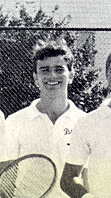
Max Burstyn, 1969
Max lived in the Jewish highlands on the other side of the public park. No flooding in the highlands there, and 99-percent yidlach. Max was equal to
1 ½ Jews. He spoke Yiddish and German. His dad was a Galitzianer from Krakow. Max was born in Munich and came to America as a baby in the 1950s.
I played tennis with Max in the park. That’s where we met.
Max still rants about the gully. He says, “You lived with the goys — like Stropki. I played Pony League with him. There were about eight Stropkis. What about Bobrowski? He was a Catholic too. Went to St. Joe’s. He played third-string for the Browns. He was from your street. There was Mastrobuono. He had a funny walk.”
True, I lived with Catholics, but I heard Jewish mothers shry gevalt (scream bloody murder) at their kids from across the park. Those Jewish moms had powerful lungs.
“Max, what about Willie Hendricks?” I said. “Why was he in your neighborhood?”
“Hendrick’s mother was Jewish,” Max said. “He could pitch.” Hendricks was about 6-4. He was drafted by the majors but never played pro ball.
Max was a self-described mischling ersten grades. (First-degree mixed race.) That’s a Nazi term, but Max used it — at least around me. Max’s mother was a German gentile and his dad was a Polish Jew. They met in Germany after the war. Max was halachically converted as a baby.
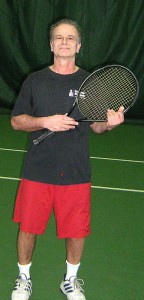
Max, 2012
Max comes to my house for shabbes. I like his Yiddish. He knows words that nobody else knows. He talks about a kudraychik — a swindler. I can’t find that in the dictionary. It’s probably Slavic, not Yiddish. For example, Max says, “There was a kudraychik, a Jewish barber, in the occupied zone after the
war . . .”
Max books rooms for a hotel chain. He works out of his house. He occasionally talks German to Europeans who want to book rooms in Florida and play golf. Max also gets calls from drunken Englishmen who call him “your majesty.” He has to work 92 percent of the time during business hours. He can watch baseball and football games on mute. “It’s not a bad job,” Max said. The occasional call from Germany, no boss and no commute. Not bad.
Max beat me at tennis. I hadn’t lost to him in a while. Did I sully the honor of the gully? I don’t think so. I’m not Catholic and I’m not gully-proud.
***
The tennis instructors at Bexley Park were mostly college kids who didn’t care about the job. One year it was Stovsky; the next year, Nagy, the state champ. These “pros” rarely showed us anything. Maybe they showed us grips: the Western, the Eastern, the Continental.
The courts were asphalt with cracks and weeds. At least the nets were real, not chain-link.
My dad got me about 10 private lessons at the Cleveland Skating Club in Shaker Heights. The pro there called me Tiger. I think he called most non-members Tiger. He was John Hendrix. He went on to coach at Ohio State.
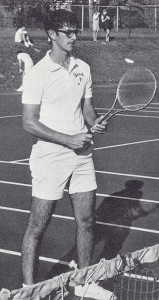
Shelly Gordon, 1969
Some of my Bexley Park tennis friends became jealous of me because of my private lessons. I got better than most of the Bexley players. One player, Shelly Gordon, still harps about my private lessons, like I violated the South Euclid Tennis Court Oath: Don’t Be a Tennis Snob. Shelly played at Ohio State and became a teaching pro in Israel. He’s self-taught. His strokes are horrible, but he’s good.
A seeming midget, Denny A., ruled Bexley Park, along with a gambler, Twitch, and a tomboy named Annie G. They bet on everything, like who could hit the most first serves in, who could bounce a ball the longest on his racquet. Bexley Park was not a genteel place. Some guys didn’t wear shirts. Billings –- the court gentile — played so much shirtless tennis he wound up with skin cancer.
Krinsky was the best hitter. He could have been a regional player, but he preferred baseball, softball and chasing girls. He was voted the “best dancer” in the senior class.
Max was third singles. Not that good, not that bad.
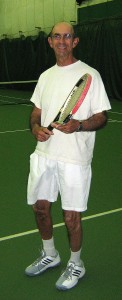
Shelly, 2012
Some of the best public court players were from neighboring Cleveland Heights. A couple Cleveland Heights boys took several private lessons at the Jewish country club, Oakwood. Garry Levy and Rich Greenberg became the number-one doubles team in Northeast Ohio.
The great public courts players of my day were:
Chuck McKinley, St. Louis
Billie Jean King, Long Beach, California
Pancho Gonzales, Los Angeles
Shelly Gordon, Cleveland
Shelly is remembered by all some in Cleveland, even though he moved to Israel years ago.
—
Yiddishe Cup plays 7:30 p.m. Thurs. (July 5) on the lawn at Wiley Middle School, 2181 Miramar Blvd., University Heights, Ohio. (Indoors if raining.) Free. It’s “Family Fun Night” with games and free ice cream one-half hour before the show.
July 3, 2012 2 Comments
THE YIDDISH POLICEMAN
Klezmer music was popular for a second in the mid-1990s. I protected talent — the klez stars. The klezmer scene had stars back then. Andy Statman, for instance. Small stars.
For security, I hired Cleveland toughs. I didn’t import Israelis from New York. I had Albanians and Ukrainians from Cleveland’s West Side. One of my guys — a goy from Lvov — had Yiddish tattoos and played tuba in a klezmer band back home.
I’m still at it — security work. My office is on Mercantile Road in Beachwood. No sign. We’re in back of Pella Windows.
I tore down a Royal Castle hamburger stand and had the tiny orange crown tiles (like on the Ontario license plate) inlaid in my company’s lunchroom floor. I’m putting in an indoor sliding board. My place is one of the “Top 10 best places to work in Ohio.” I chose it.
I do collections — rent collections. Tenants scream at my Ukie boys: “You can’t put my shit out on the street!” And my boys scream back: “You break law. You no pay rent. Now we break law!”
I’ve got ’tude, but I’m also a nice guy. I’m involved in the community. I hire summer interns from the Beachwood High wrestling team, like Sam Gross 112, Alec Jacober 130, Ryan Harris 125. These guys can squeeze through small openings.
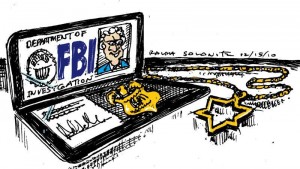 “You Want to be a Jewish Cop?” — that’s the title of my annual lecture at Beachwood High career day. I say: “Be a cop, kids, but don’t be a wussy cop. Don’t be like that cop at Heinen’s parking lot with the Harpo Marx Jewfro.”
“You Want to be a Jewish Cop?” — that’s the title of my annual lecture at Beachwood High career day. I say: “Be a cop, kids, but don’t be a wussy cop. Don’t be like that cop at Heinen’s parking lot with the Harpo Marx Jewfro.”
I still listen to klezmer. I like the music. I’m friends with Bratton — Steve Bratton — the leader of Klezmer Cup.
I know every yidl by name in Cleveland.
Call me. I’m in back of Pella Windows.
—-
SIDE B
This one, on the other hand, is real.
TICKETS
Scott Raab, a writer and former Clevelander, carries a ticket from the 1964 Browns-Colts championship game in his wallet.
I have a ticket to that game too.
Retrieved from my attic . . .
Raab’s ticket was part of an ESPN.com story about how Cleveland sports teams haven’t won a championship lately. This story — or a version of it — is recycled regularly. Raab put his ticket on the cover of his new book, The Whore of Akron, about LeBron James ditching Cleveland. (Read the book.)
The Cleveland Browns beat the Colts 27-0 in 1964. My Uncle Al, my dad, and I went to the championship game. Maybe my dad knew Cleveland would never win another championship. He was just a lukewarm Browns fan.
***
I have this ticket too, Scott Raab:
The 1964 Davis Cup finals in Cleveland.
Chuck McKinley was short. Roy Emerson was short. I was short. I was at the Davis Cup tournament. My mother bought me the ticket (which was expensive — in today’s dollars $72), and I went by myself.
In Cleveland Heights, a temporary 7,500-seat tennis stadium appeared next to a junior high in 1964. Fred Stolle and Emerson from Australia played America’s Dennis Ralston and McKinley. (Stolle and Ralston weren’t short.)
The Australians won 3-2. The score was beside the point. The 1964 Davis Cup was the best sporting event ever.
—-
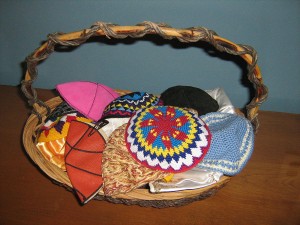 I have an essay, “And What’s That on Your Head?”, in the current issue of CJ: Voices of Conservative /Masorti Judiasm, the house mag of Conservative Judaism. (A version of the story appeared on this blog 1/5/11, titled “Yid Lids.”)
I have an essay, “And What’s That on Your Head?”, in the current issue of CJ: Voices of Conservative /Masorti Judiasm, the house mag of Conservative Judaism. (A version of the story appeared on this blog 1/5/11, titled “Yid Lids.”)
—
Yiddishe Cup plays Parade the Circle this Sat. (June 9), noon, University Circle. Best arts event in Cleveland ever. Ride your bike down there, locals.
June 6, 2012 6 Comments
IT’S ABOUT THE BIKE
I maintained records on my bike, like car owners keep track of oil changes. Like when I last greased the hub.
I stopped with cleaned power chain in 1983. I have winged it since.
My bike has miles on it. I bought it at Heights Furniture & Toy for $169 in 1978. ($586 in today’s dollars.) It’s a 10-speed Kabuki Superlight, which is not super light. The bike has been to both oceans and several foreign countries.
It’s my wife’s fault. When I met her, she was training to be an American Youth Hostels bike trip leader. On our honeymoon, we biked in the Yucatán, where we sucked high-sulfur Mexican truck fumes on jungle roads. It sucked. We parked the bikes in Mérida and took the train to Palenque.
These days — particularly on weekends — my bike goes automatically to Chagrin Falls, 12 miles east of my garage. Chagrin Falls is very pleasant.
Chagrin Falls has ice cream shops, a popcorn shop and a bookstore. Along the way, there are hills and valleys. Novelist Don Robertson called Chagrin Falls “Paradise Falls.” The town is, except when I can’t get a free cup of water at Dave’s Cosmic Subs. Lighten up, Dave. How many stores do you own already?
When I’m in southern Ohio on the Great Ohio Bicycle Adventure (GOBA), my Kabuki bike is the source of ribbing from bike geeks.
I don’t mind their kidding.
My bike doesn’t mind either.
Ask the bike. Go ahead, ask the bike . . .
***
Chagrin Falls, January 10, 2012. Endless summer . . .
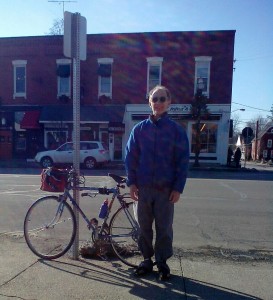
—
Jack Stratton’s Funklet made Kickstarter’s list of Top 12 Videos of 2011. See the videos here.
January 11, 2012 10 Comments
WHERE DID YOU GO TO
HIGH SCHOOL?
When Mel, the bride’s father, inquired about Yiddishe Cup’s fees, he said his grandmother had baby-sat Joel Grey (Mickey Katz’s son). Mel asked if Yiddishe Cup knew any Mickey Katz tunes.
I said, “We play more Mickey Katz songs than anybody in the world! You’ve heard us, right?”
No, he hadn’t.
I said, “Have you been under a rock for twenty-one years?”
Mel was from Cleveland. Where had he been hiding? Mel said he didn’t get around much. He used to get around. He said, “Where did you go to high school?”
“Brush,” I said.
Mel graduated from nearby Cleveland Heights High — a rival — but, nevertheless, he was OK with Brush High. He had played softball with Brush boys in a JCC league. Mel was six years old than me; I didn’t know any of his Brush buddies.
Mel’s daughter — the bride — was 31 and living in Brooklyn — Yiddishe Cup’s target demographic. I said, “Has your daughter checked out Yiddishe Cup’s Web site? It doesn’t matter if you like Mickey Katz. She’s calling the shots. ”
“Do you know Joel Schackne?” Mel said. (Schackne had been a champion tennis player at Heights High.)
“I know of him. Whose idea is the Jewish music?”
“Schackne is in Florida. He’s still playing tennis.”
“What does your daughter think about Jewish music?”
“What AZA were you in?” (AZA: a B’nai B’rith boys’ club.)
“I was in a JCC club.”
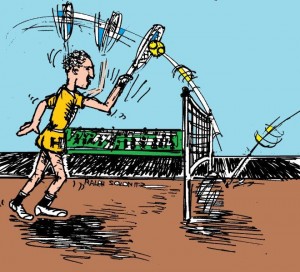
The Great Schackne
A week later, I met Bob, a cleaning supply man, and also a Heights High grad. I met him at an AIPAC meeting. Bob was not OK with Brush. He said, “Brush was a bunch of greasers and Italians!”
The AIPAC speaker, a Brush grad by the way, had left Cleveland years ago to attain multiple Ivy League degrees and become a weapons analyst with the government, maybe the CIA. He was an old friend of mine. I wanted to talk Iranian nuclear capabilities with him. The inside story. He didn’t.
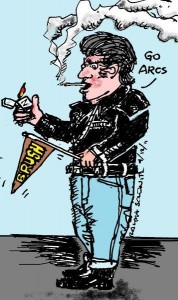 Ron, a Brush graduate living in Connecticut, phoned to say he was in Cleveland at a nursing home, visiting his dying mother. Ron asked if anybody was still in town. (“Anybody” meant “Our Crowd.”)
Ron, a Brush graduate living in Connecticut, phoned to say he was in Cleveland at a nursing home, visiting his dying mother. Ron asked if anybody was still in town. (“Anybody” meant “Our Crowd.”)
I said, “Nobody is here.” Most of our gang had left. The Jewish guys still in town were, for the most part, entrepreneurs and family-business owners. A couple local guys had even made serious money. One, who built cell phone towers, was a playboy with femme fatales poolside.
Howard, a Brush grad in New York, called. He was coming through Cleveland. His parents were moving to assisted living. He said we should get together.
Did I have a post–high school life?
I think so. I’m not stuck on high school. But the subject does come up. I live in my hometown. What can I say?
Go Arcs.
—-
1. Mel didn’t hire Yiddishe Cup for his daughter’s wedding.
2. The Arcs is the nickname of Charles F. Brush High School. Brush, a Cleveland inventor, developed the arc light, which illuminated streets prior to the incandescent bulb.
—-
A version of this post appeared in the Heights Observer online on April 26, 2011.
June 29, 2011 3 Comments
THE JEWISH PING-PONG LEAGUE
1. EAST DIVISION
The ping-pong season started several months ago, when violinist Steve Greenman called and said “I want to play ping-pong tonight.” He got tilapia out of it. Not a bad night for a single guy (soon to be married). My wife, Alice, cooked.
Ping-pong is predominately a winter sport in Cleveland. The Jewish ping-pong dean here is Valeriy Elnatanov. He’s a Russian pro who used to teach ping-pong and pilpul at Green Road Synagogue, an Orthodox shul. [Not sure about pilpul (a Talmudic study method) but he did teach Hebrew to Russians.]
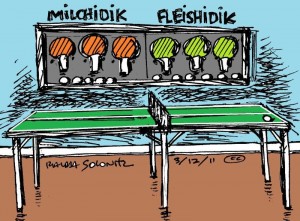
Valeriy moved on to other training facilities. I saw him at the Shaker Heights community building playing top-notch Asians.
Valeriy said the best way to develop a top-spin forehand is to turn a bicycle upside-down and swat repeatedly at the spinning tire with your paddle. I never did that, but I thought about it.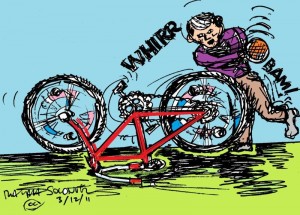
When Valeriy practiced, he used dozens of balls. That’s the way to go. You bend down less.
My wife, Alice, has a good forehand slam. Steve Greenman has a steady backhand. Neither cheats. Many ping-pong players don’t toss the ball up high enough on the serve.
2. WEST DIVISION
How come documentaries about California musicians — Hal Blaine, the Sherman brothers — have poolside shots, but no outdoor ping-pong shots?
I played ping-pong on a patio in Los Angeles. You don’t forget that if you’re from the Midwest.
In the Cal movies, the musicians are sunbathing poolside. Are they embarrassed to show their ping-pong moves? (The Kids Are All Right, set in California, had an outdoor ping-pong table. No musicians playing, though.)
My father, Toby, had a childhood friend in Los Angeles, Irv Drooyan, who taught school, wrote math textbooks and played outdoor ping-pong. Toby kept in touch with Irv and one other Clevelander in California, Sol of San Diego. In the 1950s, California was just an extension of Cleveland.
These friends of my dad occasionally switched their first names — maybe to dodge anti-Semitism. Irv was Red. Sol was Al. Toby was Ted.
My introduction to outdoor ping-pong was on Red Drooyan’s patio in Woodland Hills, California, in 1962. Unforgettable because a) it was outdoors, and b) I didn’t know my dad had any friends. In Cleveland, my father had hung around exclusively with my mom’s friends and their husbands.
California was about a) stippled paddles — with a woody sound, and b) my dad with friends.
Good vibrations. Got to get back there.
To 1962 or California?
To the ping-pong table.
Your serve.
—-
[For goys only. In Ralph Solonitz‘s ping-pong table illustration, “milchidike” refers to dairy and “fleishidike” means meat. The two major divisions in the Kosher League.]
—-
Please see the post below too. It’s raunchy and new.
—-
Yiddishe Cup celebrates Purim this Sat. (March 19), 7:45- 9 p.m., Park Synagogue, Cleveland Heights. Open to all. Free.
March 16, 2011 9 Comments
THE TENNIS COURT SHOVELER
Rich Greenberg, a former tennis pro, thanked me for the blues harmonica lessons I gave him 32 years ago. My lessons — in conjunction with pros’ instructional videos on YouTube — had helped him, Rich wrote in an email.
Rich ended with “Do you still play tennis?”
What? Tennis? Tennis was another lifetime ago, Rich. And what exactly is “tennis”? Hacker tennis, club level, or college caliber?
When Rich and I were in high school, tennis was a tree of life to lay hold fast of. Rich shoveled the snow off the courts at Cain Park in Cleveland Heights. Nuts. He played so well he wound up on the UC-Santa Barbara team. Maybe the Cali coaches needed a court shoveler. (Rich has been out west for decades.)
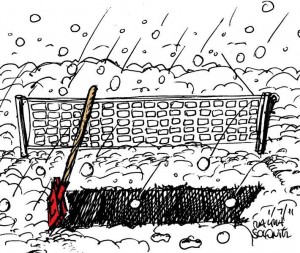 Rich taught me an important life lesson: how to wait. I waited six months every winter to play tennis. I wasn’t going to shovel courts. Think about it: no snow blowers in the 1960s, and the courts had to be perfectly dry. And right after you shoveled, it would snow again.
Rich taught me an important life lesson: how to wait. I waited six months every winter to play tennis. I wasn’t going to shovel courts. Think about it: no snow blowers in the 1960s, and the courts had to be perfectly dry. And right after you shoveled, it would snow again.
Contemplating tennis — and not playing — was like practicing music without an instrument. It was doable, but not much fun. I had Bill Tilden’s book on singles and Gardnar Mulloy’s doubles book. There was no tennis on TV.
I wasn’t in Rich’s league. (Correction: I was in Rich’s league. Rich went to Cleveland Heights High and I went to Brush High. Heights and Brush were in the Lake Erie League. No question, though, Rich was much better than me.)
Tim Gallwey in The Inner Game of Tennis recommends watching the spin on the ball. Focus on the rotation of the ball’s seams. The author of The Inner Game of Music said something similar. Focus. I can’t remember on what. (Not as good a book as Inner Tennis.)
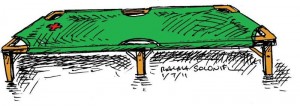 I sometimes focus on a green cot, as a mental image, when I play a concert. The cot is an emergency-shelter Red Cross cot. Keeps me calm.
I sometimes focus on a green cot, as a mental image, when I play a concert. The cot is an emergency-shelter Red Cross cot. Keeps me calm.
When I was a sub on a gig, the bandleader shouted at me: “Listen!” Meaning “Listen to the music!” Maybe I was distracted by the hors d’oeuvre.
In my twenties, after college, I thought tennis was just stupid. Dumb. Existentially dumb. Two adults hitting a ball over a net. That was not solving any world problem.
I hung out with Rich at his tennis pro job in Rocky River, Ohio. Rich said he couldn’t teach the middle-aged women — the 35 year olds — anything new. He said, “I wish tennis hadn’t boomed. It would force me to do something else.” He spent time arranging interclubs between “our girls” and Lorain.
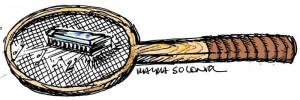 Rich, in his email, asked if I still played harmonica. I said I sometimes play harp in first position on the song “Tsena, Tsena.”
Rich, in his email, asked if I still played harmonica. I said I sometimes play harp in first position on the song “Tsena, Tsena.”
“First position” means playing diatonically (no sharps, no flats). It is usually simple non-bluesy melodies. First position, initially, is insipid and idiotic, just like tennis.
Then you grow up.
—
Please see the next post too. It’s an original video from Klezmer Guy Studios.
January 26, 2011 2 Comments
FOOTBALL . . . WHY?
In the Midwest, you need to know something about football. You don’t need to know much.
Here’s what you need to know today:
1. Rich Rodriguez — the just-fired Michigan football coach — is going to the University of Pittsburgh, where the brand-new Pitt coach allegedly beat up a woman and just got fired. (This is speculation, the Rich-to-Pitt bit.)
2. The Big Ten has 12 teams. The league should add the University of Toledo and put a lid on new powerhouses.
3. I told my sons I was going to watch the Mississippi State – Michigan game on New Year’s. They laughed at me. Who cared about that game, they said. (I didn’t dare watch.)
4. My Ohio State-alum dad, of blessed memory, is breathing easy for another year; Ohio State beat Arkansas in the Sugar Bowl.
5. The Sugar Bowl is the Allstate Sugar Bowl. Next year take a charter flight to the Manischewitz Borscht Bowl. Everybody wears pink and knocks back “l’chaim” vodka shots. It’s in Pinsk.
6. My former neighbor, a rabid Michigan fan, lit a votive candle after every Wolverines touchdown. The candle triggered a music box that played the Michigan fight song. Those were the days. Michigan won a lot. (About four years ago.)
7. What’s Michigan going to do for a coach? You tell me.
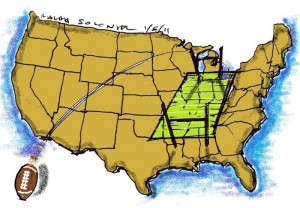 8. If you want to see real, quality, cheatin’ football, go down south.
8. If you want to see real, quality, cheatin’ football, go down south.
9. Maybe you don’t want to see football. Then please see the Weekend Klezmer Report,
item #10:
10. Klezmer star Michael Winograd is bar-storming the West Coast, playing nearly every bar and bar mitzvah between Los Angeles and Oregon. Tomorrow The Wino is at Havurah Shir Hadash in Ashland, Oregon. Kikhl-off is 8 p.m.
[Kikhl is “sugar cookie.”]
—-
Thanks to journalist Stan Urankar for the Rich Rod–to-Pitt tip.
January 7, 2011 2 Comments
WOLVERINE BLUES
1. RAH-RAH AND SO-SO
A simple fall pleasure is walking around Shaker Lakes listening to Michigan football on the radio.
I came by this diversion fairly recently. My older kids went to liberal arts colleges with no football teams. I figured my youngest child would too. I took him to Oberlin on a college tour and said, “Can you see yourself here?”
“In a word, Dad, no,” he said. “There’s not enough sports talk.” Jack, the youngest, wanted rah-rah.
He went to Michigan and got rah-rah. We rehashed the football games his freshman year.
I monitored the university’s Web site like a helicopter parent. I told my son to audition for the pep band, the Hillel a cappella group, the school’s percussion group and anything else he could think of. I wanted him to find a niche at the Big U.
And I wanted Michigan to win at football, because my son was so rah-rah.
I followed the football games on the Internet my son’s first year. I didn’t know about the games on Cleveland radio. That was stupefying — the Internet — like staring at a tickertape: Joe Blow . . . 3 yards . . . 3rd and 5 . . . M 46 yard line.”
Then I serendipitously found Michigan football on Cleveland radio. No more squinting at the computer. The announcer promoted Detroit pizza parlors and grocery stores. I felt like a ham operator picking up an exotic locale. “Gratiot at 8 Mile.” CKLW radio — the border blaster — was sending out the Wolverine word from Windsor.
Michigan football isn’t on CKLW this year. It’s on a weak FM station from Detroit. End of my fall bliss.
The team used to be good, then suddenly stunk. The university hired a new coach.
I asked my son what he thought of the new guy.
He said, “Who is it?”
He didn’t know about Rich Rod! (Rich Rodriquez, the new coach.) Jack had fallen under the sway of the football atheists at the Residential College and music school.
I knew more Michigan football than my son. I was now rah-rah and he was so-so. Odd.
***
2. SONNY, LISTEN
A PhD classical music student at the co-op house in Ann Arbor didn’t like my practicing. He didn’t like jazz, period. And he didn’t like my girlfriend. He called her a “hole,” which was black slang around 1970. This guy, though, was a tall blond Texan.
Tex would answer the house phone and announce to one and all: “Bertie, your hole is on the line.” (“Bertie” wasn’t too cool either.)
I punched him. He was seated on the couch in the co-op living room. I hit him and his coffee went flying. He stopped bugging people — at least me — after that. He thought I was nuts.
I wasn’t nuts. I haven’t attacked anybody since, except a teenager I punched when I taught at an ESL school. (Different story.)
In 1970 Miles Davis had just released Bitches Brew, the first big-time jazz-rock album. I borrowed recordings of Hank Crawford, Lou Donaldson and Rufus Harley from black students. I went to Baker’s Keyboard Lounge in Detroit to see Gene Ammons, Sonny Stitt and Roland Kirk.
Tex became an administrator in the Michigan music school. Mazel tov. He stayed there forever.
My youngest kid went to music school at Michigan. Mazel tov. I occasionally went to see my son perform and kept an eye out for Tex. I didn’t run into him. I was ready to apologize, unless he called me Bertie again.
Bertie? That numbskull, I swear . . .
October 13, 2010 6 Comments
CLARINETS ON BIKES
I played a crummy clarinet, blasting against the side of a barn door on a bike trip in rural Ohio. I nearly destroyed my lip.
Last summer my friend Mark Schilling from Japan wanted to ride the Great Ohio Bicycle Adventure (GOBA), so I couldn’t very well say: “Mark, I’m passing on GOBA. I have a big gig coming up and need to practice.”
I had to practice for Yiddishe Cup’s twentieth anniversary concert, which was the day after the bike tour.
Some musicians don’t need to practice; they practiced in music school and can wing it as adults. I didn’t go to music school. I have to feel the notes in my fingers and brain almost daily before a big show.
My borrowed cheap clarinet had decayed pads, squeaky keys and cracked dirty reeds. The mouthpiece had layers of caked lip gunk. The axe was plastic and generic. No name. I got it from a friend. Ray-somebody in Sioux City, Iowa, had once repaired it; his card was in the case.
Why didn’t I have a back-up axe of my own? Was this an example of rigid thinking on my part? I had put my professional clarinet through so much — parades and other outdoor indignities — and didn’t own a back-up. For example, I should have had a plastic horn for the 2004 Israel Independence Day parade when we marched outside in 40 degrees. (One Yiddishe Cup musician went AWOL on that parade because he didn’t play under 50.)
On the GOBA trip, I played next to the Wood County Fairgrounds sheep barn. If I had stood in the middle of the horse-showing ring and played — without the barn wall to bounce sound off — I would have blown my lip out even more.
I had to practice high notes, which cheap clarinets don’t do well. You need a decent mouthpiece and a quality reed. I bit down hard and tore my lower, inside cheek.
Nobody on the bike tour — about 2,500 riders — complained about my playing. Midwesterners, particularly bicyclists, are very tolerant and polite.
I also practiced at a high school football field. That town, Elmore, had a bass drone coming from the Ohio Turnpike a block away.
I used cortisone cream on my cheek.
The final day of the ride, my friend and I performed at the bike rally’s talent show. Mark and I had written a song about aching backs, bad food and smelly port-a-potties. So had all the other contestants. The difference: our tune had a klezmer clarinet.
We riffed on the melody “Nayer Sher,” a.k.a. the “Wedding Samba,” popularized by Xavier Cugat. I had heard that 1950s tune on Muzak in a Cleveland grocery store. The song had crossover appeal.
But we didn’t win.
A barbershop trio did. They sang about tandem bike riders smelling each other’s gas. We hadn’t thought of that.
Irwin Weinberger, a veteran GOBA cyclist and Yiddishe Cup’s singer, came in second. Irwin inserted port-a-potty lyrics into the Kinks’ “Lola.”
Irwin hadn’t practiced all week. Irwin is a natural. And he’s a gas.
—-
GOBA begins June 20 in Logan, Ohio. The GOBA encampment is half Pilot Gas rest stop, half Cabela’s. There are six semi-haulers and many tents. The semis carry the cyclists’ baggage. Two of the semis are actually mobile shower trucks (which are sometimes used for natural disasters). There is close-quarters snoring on the football field, with hundreds of tents pitched within several feet of each other. Rated: Difficult.
—-
Yiddishe Cup plays the post-parade concert at Parade The Circle 1 p.m. this Sat. (June 12). Wade Oval, Cleveland. Traffic tip: Ride your bike to the parade and park in the Ohio City Bicycle Co-op lot.
June 9, 2010 3 Comments
STANDING IN THE SHADOW OF LeBRON
1. GOT A CARD? NO!
I was a guest at a wedding where the band’s sign was bigger than LeBron James. The banner was eight-foot, like something you might see on a telephone pole announcing “125 years of excellence in education.”
The wedding reception was elegant, but the band’s sign was totally Bedford Auto Mile. The sign read “More Acts, Better Music, Higher Standards.”
Higher Standards? The bandleader was Italian. I knew him. Roman standard bearers? The bandleader said to me, “It’s better to be a guest than to work, huh?”
What? I always prefer playing over schmoozing.
When Yiddishe Cup does weddings, I hand out business cards. Nothing gaudy. And I don’t shovel them out. These cards are almost collectors’ items. I’m not going to pass them out willy-nilly.
Everybody already knows Yiddishe Cup. If you say “klezmer band” in Ohio, it’s us. Now, if we’re in Buffalo, N.Y., for example, I might go heavier on cards. But I don’t put out a tray. That’s too dental office.
Granted, we feature Yiddishe Cup’s logo on our bass drum. Our logo is cool, whimsical and tasteful, and it gets us some gigs. (Ralph Solonitz designed the logo.)
At the “Higher Standards” wedding, I met a businessman who did music production as a sideline. I asked for his card. He didn’t have one. And he had 100 employees, he said.
He had achieved placid-plus status: no card.
My goal is to be him.
***
2. BALLISTIC / LOADING / CAVS
A Yiddishe Cup musician went ballistic when he saw a college football game, or so he thought, off in the distance. He said, “I’m so through with this country’s obsessions with sports!”
Yiddishe Cup was loading-in at a student union by a college stadium.
The Yiddishe Cup musician had fouled. Here’s why: (1.) The college kids were playing lacrosse, not football. (2.) It was a Division III game. The stadium was small, with no crowd to speak of. (3.) The kids were getting some exercise; this was not a big money, faux-pro game.
Yiddishe Cup musicians, for the most part, are not up on today’s sports scene. For instance, I just learned a basketball shot “from downtown” means a three-pointer. And I’m wondering what “the post” is. I watched several basketball games lately.
I have an agreement with my cousin George, a serious sports fan, to go to the Cavs victory parade. I want to be there. Depends on my Depends though, because I’ll be very old. Also, depends if it’s raining. I’m fair weather.
Last Sunday Yiddishe Cup had a gig, a pre-Shavuot Torah dedication/celebration, which was almost postponed to accommodate LeBron James’ reading of the Book of Kells. The Cavs were scheduled to play the Celtics then. (Cleveland lost prior, on Thursday, so the playoff series ended, and everything worked out fine for the Torah dedication.)
About championships . . . My father, Toby, promised to take me to the World Series, but the Tribe never made it when I was growing up. My dad, instead, took me to Ohio State homecoming games.
I took my kids to the 1992 OSU homecoming game. The Ohio Stadium scoreboard lit up: This Sat. at the Wexner Center, Don Byron Salutes Mickey Katz.
What next, Bucks? “Fight the Team Across the Field” in Yiddish?
Don Byron played OSU, I think, because Columbus resident Les Wexner, the billionaire owner of The Limited, paid Byron’s band to entertain Wexner’s elderly mother, who probably requested the Mickey Katz show because she didn’t want to fly to New York. That’s the only logical explanation. Don Byron never played any other Mickey Katz–tribute shows in Ohio.
Go Mickey.
Go Katz.
Go ‘Cats.
Go Cavs.
If you’re a Cubs fan, or whatever, be quiet about your sports-induced suffering. You don’t know anything.
May 19, 2010 3 Comments




